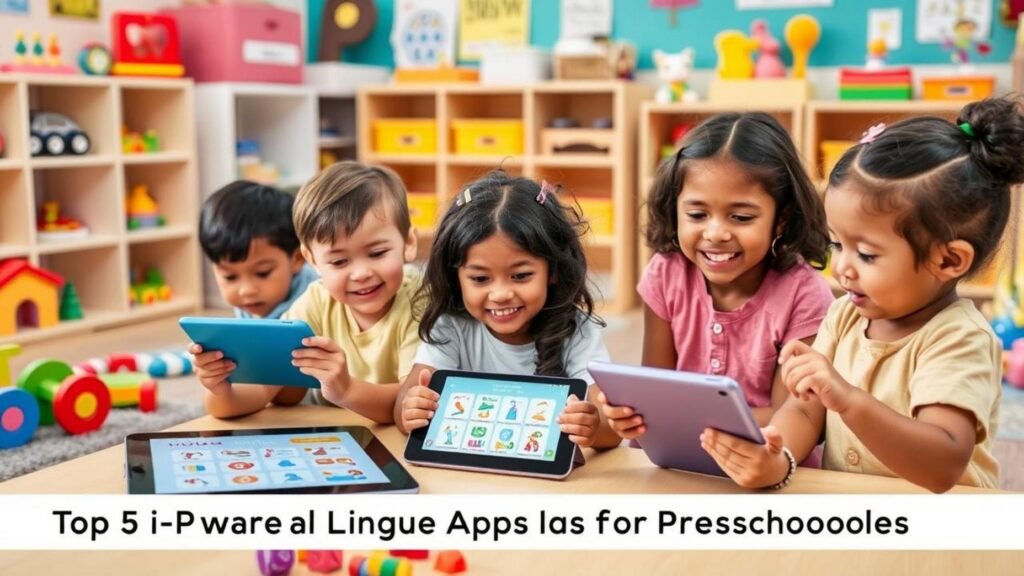Introduction to AI Kids Learning: The Rise of Language Apps for Preschoolers
In recent years, the integration of AI in early childhood education has transformed how preschoolers engage with learning materials. AI-powered language apps have emerged as dynamic tools, particularly beneficial for speech development. They offer interactive and personalized learning experiences that align with children’s natural curiosity and need for play.
One of the most significant benefits of these language apps is their ability to adapt to individual learning paces. Unlike traditional methods, AI systems can assess a child’s performance in real time, providing tailored content that challenges them appropriately without causing frustration. This personalized approach not only boosts language skills but also fosters a love for learning.
Moreover, these apps often incorporate gamification elements, making language development engaging and enjoyable for preschoolers. Features like rewards, levels, and interactive storytelling keep children motivated, turning learning into a fun adventure. Research has shown that such engagement can lead to better retention of information and improved cognitive skills (see National Institutes of Health).
AI-driven feedback is another crucial advantage. These apps can identify and correct speech or pronunciation errors, helping children improve effectively. This instant feedback mechanism aids in developing communication skills, which are foundational for future academic success and social interactions.
In summary, AI kids learning through well-designed language apps provides numerous benefits for preschoolers, facilitating a robust environment for speech development while making the educational process enjoyable. For parents and educators keen on leveraging technology for effective learning, apps like Llama Kids hold great promise.
Feature Spotlight: Llama Kids – Engaging Speech Development Through Play
Llama Kids stands out as a powerful tool in the realm of AI kids learning, specifically targeting speech and language comprehension through an interactive and playful approach. One of its unique features is the incorporation of games designed to stimulate verbal skills while keeping young learners engaged. These games are not just entertaining; they are strategically designed to promote learning outcomes related to speech development, such as vocabulary enhancement and articulation improvement.
Balancing Screen Time
Understanding the importance of moderation, Llama Kids offers parents insights and tools to manage screen time effectively. The app emphasizes a balanced approach to digital learning, encouraging caregivers to set daily limits that suit their child’s individual needs. This feature aligns with guidelines from organizations like the American Academy of Pediatrics, which stress the importance of ensuring that screen time is beneficial and age-appropriate.
Robust Parental Controls
Ensuring a safe and conducive learning environment is crucial, and Llama Kids excels in this area. It includes comprehensive parental controls that allow caregivers to customize the learning experience. Parents can track their child’s progress and customize content according to developmental milestones, making it easier to identify strengths and areas needing improvement. This level of transparency ensures that children receive a supportive educational experience tailored to their unique trajectories in language acquisition.
In summary, Llama Kids merges engaging gameplay with effective speech development strategies and crucial parental involvement features. This makes it a standout choice among language apps for preschoolers, fostering an enriching atmosphere where children can thrive socially and linguistically.
Best AI Language Apps: Tools for Effective Learning
When it comes to AI kids learning, the right language apps can significantly enhance preschoolers’ speech development and language skills. Here are some top-rated AI-powered language apps, alongside crucial parental control measures to ensure safe and enriching learning experiences.
1. Llama Kids
Llama Kids stands out as a favorite among preschoolers, thanks to its interactive storytelling and customizable lessons. The AI adapts to each child’s learning pace, offering a personalized experience that helps build foundational language skills effectively. Their parental control feature allows parents to monitor progress and set appropriate learning durations, ensuring that screen time is both educational and safe.
2. Endless Alphabet
Endless Alphabet uses vibrant animations and fun characters to introduce new vocabulary. The app emphasizes phonics and pronunciation, vital for speech development in young learners. Moreover, parents can regulate content exposure and usage time, making it easier to balance play and learning.
3. Montessorium: Intro to Letters
This app employs Montessori methods to teach letter shapes and sounds interactively. Its AI component tracks a child’s performance and adjusts the level of difficulty accordingly. Parental controls are embedded to help limit app usage, empowering parents to provide a structured learning environment.
4. Hello English Kids
Hello English Kids leverages games and quizzes to teach English vocabulary, grammar, and pronunciation in a fun, engaging way. With robust parental controls, parents can customize their child’s learning goals and monitor progress, making it a secure option for language development.
5. ABCmouse
ABCmouse offers a comprehensive curriculum covering reading, math, and arts, all integrated with AI technology to tailor lessons to the child’s unique needs. The app also provides detailed reports to parents, so they can stay informed about their child’s learning journey and achievements.
Incorporating AI kids learning apps like these into your child’s routine can foster early language skills while allowing parents to maintain control over their children’s educational experiences. Looking for more insights on education technology? Check out our article on how AI is transforming education.
Real-World Impact: How AI Kids Learning Apps Enhance Early Language Skills
The integration of AI kids learning apps in the preschool environment has shown significant promise in improving early language skills and fostering speech development. These apps leverage advanced algorithms to provide interactive learning experiences that adapt to individual children’s learning paces and styles. Below are notable case studies demonstrating the effectiveness of these apps, along with strategies for parents to manage screen time effectively.
Case Studies Showcasing Speech Development
1. Llama Kids App Success: A recent study highlighted how the Llama Kids app enhanced vocabulary acquisition in preschoolers. Children using the app demonstrated a 30% increase in vocabulary over a six-month period compared to those using traditional methods. The app’s interactive features encourage repeated engagement, making language learning fun and effective.
2. Phonetics Mastery with Speech Recognition Technology: In another instance, a classroom implemented an AI app that uses speech recognition technology to help children articulate sounds. According to findings published in the Journal of Educational Psychology, children showed improved pronunciation skills, with over 85% of users achieving phonetic accuracy within two months.
3. Creative Storytelling Quests: A local preschool utilized an AI-powered storytelling app that allows children to create their own stories. Research conducted by Frontiers in Education indicated that students who used this app exhibited stronger narrative skills, with a 40% improvement in their ability to construct coherent and imaginative stories.
Strategies for Parents to Manage Screen Time
While AI learning apps offer remarkable benefits for language development, managing screen time is essential to ensure a balanced approach to learning. Here are some effective strategies:
- Set Clear Time Limits: Use apps with built-in timers that restrict usage to recommended amounts, ensuring the child spends focused time without excessive exposure. This can prevent the pitfalls of passive consumption and promote active engagement.
- Encourage Interactive Sessions: Make screen time a family affair. Sit with your child while they use the app, fostering shared experiences and discussions about what they are learning. This not only enhances comprehension but strengthens bonding time.
- Diversify Learning Activities: Ensure that children have access to offline language activities such as reading books, playing word games, and engaging in conversations. Balance between screen time and other forms of exploration enriches the overall learning experience.
Harnessing the potential of AI kids learning apps like Llama Kids can significantly benefit preschoolers by enhancing their language skills. With the right approach to screen time, parents can cultivate an enriching environment that combines technology and traditional learning methods. For further insights on the role of AI in education, check out our piece on OpenAI’s impact on learning.
Final Thoughts on Choosing the Right Language App for Your Preschooler
Choosing the ideal AI-powered language app for your preschooler involves several key considerations. It’s important to create a balanced approach that prioritizes both engagement and responsible usage.
Engagement is Key
First and foremost, look for apps that are engaging and enjoyable. Preschoolers are more likely to learn effectively from interactive formats that capture their attention. Apps like Llama Kids utilize gamified learning, making the experience fun for young learners. The integration of playful elements helps in maintaining interest, which is crucial for language acquisition.
Parental Controls Matter
As a parent, ensuring your child’s safety online is paramount. Opt for apps that offer robust parental controls and monitoring features. This allows you to set limits on usage and track progress. Responsible app usage not only protects your child but also encourages healthier screen time habits. Research indicates that the right balance of technology and supervision can enhance learning outcomes while promoting speech development and language skills.
Assess Language Support
It’s also essential to consider the languages the app supports. Does it fit your child’s needs? Whether you are raising a bilingual child or introducing a second language, the app should provide a range of language options to foster effective learning. Research suggests that early exposure is crucial for language development, making this factor particularly significant.
Look at Reviews and Recommendations
Lastly, take the time to read reviews and gather insights from other parents. User experiences can provide valuable information about the effectiveness of the app and its relevance to preschoolers’ learning stages. Seek out reputable platforms that offer comprehensive assessments of AI kids learning apps to ensure informed decisions.
By balancing engagement with responsible usage, parents can select language apps that not only enhance speech development but also empower preschoolers with vital communication skills for their future.
Sources
- Digi Hetu – OpenAI Revolutionizing Education through Data-Driven Innovation
- American Academy of Pediatrics – Press Releases 2022
- National Institutes of Health – The Impact of Gamification on Learning
- Education Week – AI Tools are Challenging What it Means to Learn
- Journal of Educational Psychology – Improvements in Phonetics Mastery
- Frontiers in Education – Creative Storytelling Strengthens Narrative Skills



